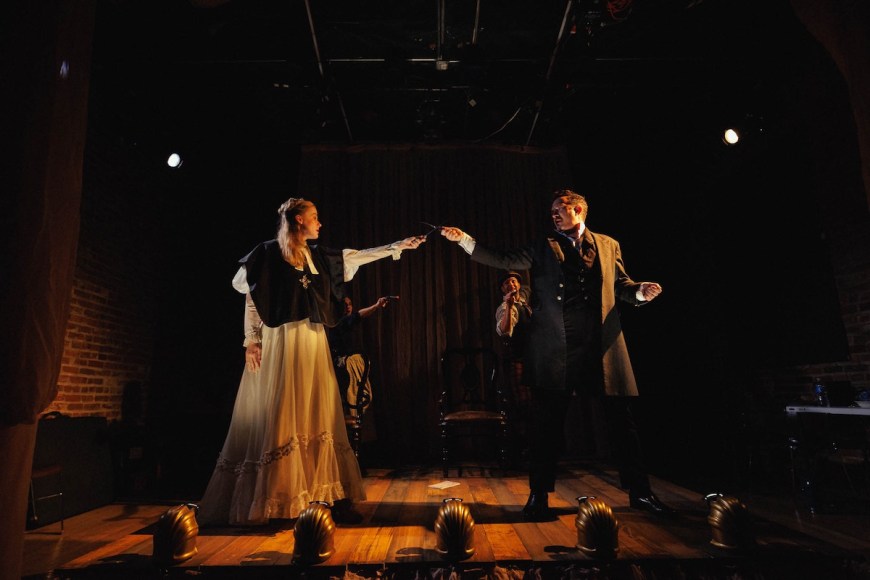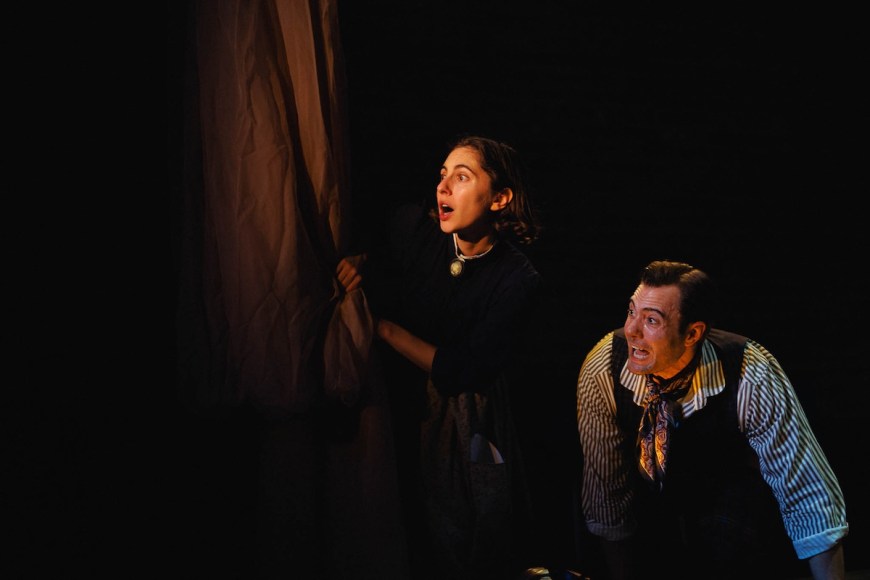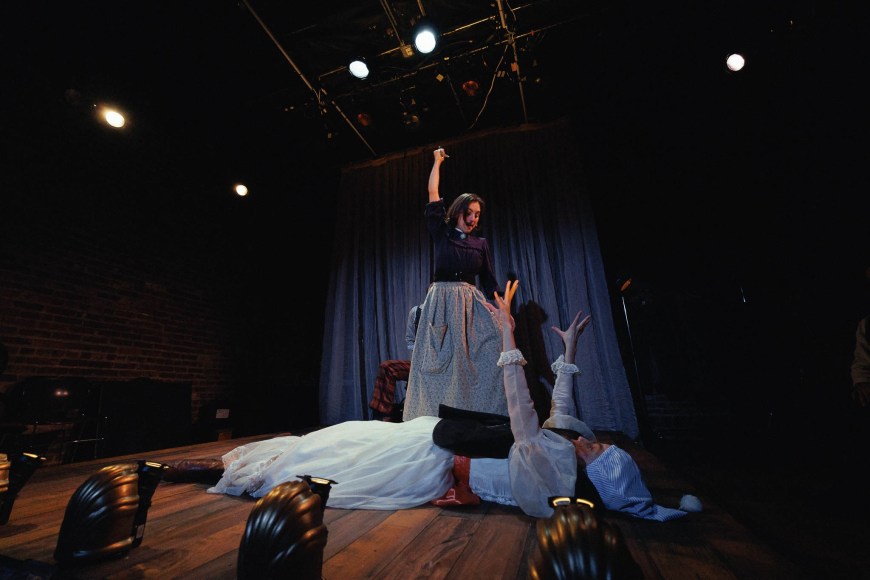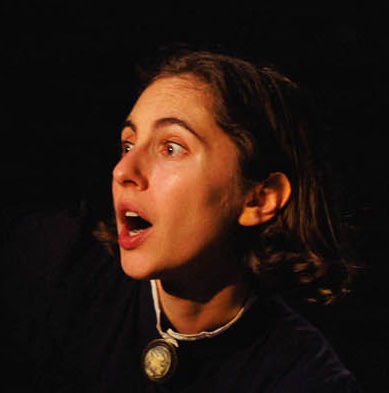
“Jewish Plot” starts as an entertaining resurrection of a (fictitious) 19th century play about antisemitism written by an obscure British playwright, and descends into a kind of mad poetry about current-day Jewish identity by the actual playwright, Torrey Townsend, the grandson of a leading Zionist who wrote speeches for Golda Meir. It’s a meta-theatrical experiment, an expression of ambivalence and horror, an exercise in indulgence, and (for the actors and the audience) a test of endurance.
The production begins with the appearance on stage of cast member Madeline Weinstein, using her real name, to introduce “Jewish Plot, or the Semite of Mayfair,” which she tells us was written by one Irwin Willoughby Bruntmole and last performed briefly in 1889. The only existing copy of the script was discovered in the attic of an abandoned pub in London in 2006. But the script was incomplete, she explains, and so Torrey Townsend has been working on reconstructing it for years, right up until the present moment; indeed, he’s right now backstage in the dressing room, finishing up Act II.

With comically stilted language and exaggerated gestures, the four actors in the cast then perform Act I, each portraying multiple roles. In the first of the four scenes, Baron Morris Von Azenberg, an aristocratic British Jew, is in love with a beautiful actress, Miss Sophia Fitzkernerton. She loves him back, but reluctantly rejects his proposal of marriage because her entire family disapproves of him: The discovery of their love gave her father a heart attack, “..my mother simply sits, head bowed, saying that she ought to gather up stones to hurl at the ‘Jew devil.’ And my brothers, they are knotting up their whips, frothing and foaming, all of them crying out, ‘Death! Death to the filthy Jew beast!’” The remaining three scenes involve Abbé Artemis de Romantis, a French cleric who is famous for having written an antisemitic tract, and a brother and sister who own a disreputable inn called The Sgorg. The Abbé and the Baron both happen to show up at The Sgorg at the same time, and…I won’t reveal what happens. I’ll only say that the first half hour or so is both engaging and entertaining — engaging because of the ways it is almost convincing as an actual play from the 19th century; entertaining because of the ways that it isn’t.

At the conclusion of Act I, the cast members retrieve huge stacks of paper – the scripts for Act II, which Torrey has just completed. The plot continues with the cast members sitting down at a desk reading, trying to stay in character, but soon the story becomes insanely ugly and the script is more and more taken over by Townsend’s personal rants and resentments. We’re told in numerous ways that Townsend has gone insane. At one point, Weinstein, who narrates Townsend’s stage directions, says: “The set transforms into a symbol of what has happened to my brain. Into a gigantic pit of ash and bone.”
Much of the final hour in this 90-minute piece challenges the audience’s patience and tolerance, perhaps trusting that we’ll be able to hear the soundbites of political and cultural argument through the noise of its deliberately off-putting stream-of-consciousness. Towney (through the script read by the performers) complains that other playwrights use their Jewish identity to get ahead. Imagining his agent talking to him, he says (the performer now in effect portraying the agent):
“Maybe if you had given us an Oslo, if you’d given us a Lehman Trilogy, given us Indecent, but instead you totally fucked yourself, why couldn’t you have done a Just For Us, like Edelman, get an Emmy, are you above that? Too good for that Borscht Belt Yiddish shtick everybody eats up like Pop-Tarts? Too good for the streamers? HBO? Peacock? Too good for checks coming in the mail every month? Too good for using your Jewishness to actually be successful?”
His attacks can be personal – “all Joshua Harmon does is write the same old schmaltzy wannabe Neil Simon crap”—which is inappropriate in a way that is shocking but also sort of funny (if you’re not Joshua Harmon.)
But there is little humor left as the script becomes a jumble of complaints and attacks, sometimes erudite allusions and lots of run-on sentences. He labels members of Congress neo-Nazis, for example, for promoting antisemitic conspiracies even as they fund the Israeli military assault on Palestinians
He seems especially harsh about Zionism, past, present and future. After offering some biographical details about his grandfather, Meyer Steinglass, he takes on Grandpa’s persona (or actually Weinstein the performer does) to welcome Ebenezer Scrooge to Jerusalem, saying it’s a great time to move there: “Yes we still have Muslims and Palestinians, but that’s only a short-term issue, Mr. Scrooge. Next decade, they won’t be here anymore… Next decade, Riviera of the Middle East.”
The moments I’ve selected to share may give a misleading impression that there is a coherent point to the play, or even a coherent political point of view. “Jewish Plot” is clever and bold, but it’s ultimately too diffuse and too self-conscious to be brilliant. By creating an alternate persona who has had a mental breakdown, and giving it responsibility for what unfolds, Townsend seems to be giving himself an out. The device feels like an effort at self-protection (in case he meets Joshua Harmon at a party?) Claiming insanity offers no explanation nor insight; it’s a way to avoid explanation or insight. Neither Samuel Beckett nor Allen Ginsberg (both of which feel live influences) would have made such an excuse.
Jewish Plot
Theater 154 through November 7
Running time: 90 minutes, no intermission
Tickets: $27 – $73
Written by Torrey Townsend
Directed by Sarah Hughes
Scenic design by Frank J Oliva, costume design by Caity Mulkearns, lighting design by Jordan Barnett, sound design by Peter Mill Weiss and Robin Margolis
Cast: Neil D’Astolfo, Tess Frazer, Eddie Kaye Thomas, Madeline Weinstein
Like this:
Like Loading…
Related

